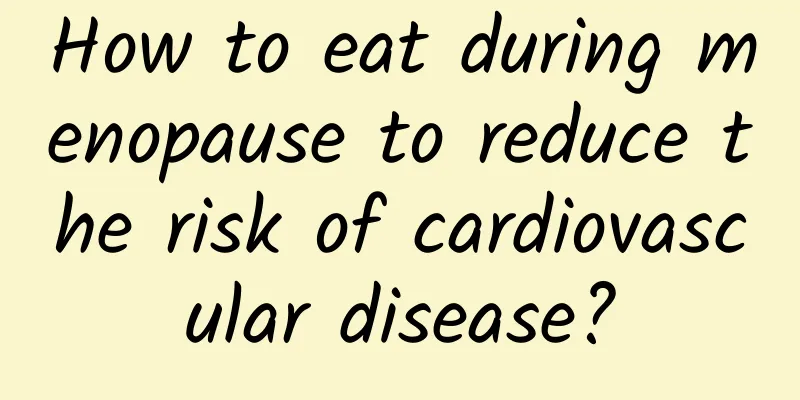How to eat during menopause to reduce the risk of cardiovascular disease?

|
How to eat during menopause to reduce the risk of cardiovascular disease? Cardiovascular disease is the number one killer that threatens health. Studies have found that the incidence of cardiovascular disease in women after menopause increases sharply and is significantly higher than that in men, which is related to the decrease in estrogen in women. Estrogen not only regulates lipids and lipoproteins in the blood, but also protects the heart by affecting the coagulation system and vascular endothelial system. Starting from the perimenopause period, as the estrogen level in the body decreases, low-density lipoprotein and triglycerides increase, high-density lipoprotein decreases, and the prevalence of cardiovascular diseases such as hypertension and atherosclerosis increases. The decline in estrogen associated with menopause It is a period that women must go through in their lives. So what should we pay attention to in our diet and daily life? To reduce the decline of estrogen What are the risks of cardiovascular disease? Regular consumption of beans and their products Beans and their products are rich in soy isoflavones which can significantly reduce the concentration of cholesterol and triglycerides in the blood. Studies have found that soy isoflavones also have certain protective and anti-inflammatory effects on blood vessels, and can effectively reduce atherosclerosis and the formation of blood clots. In addition, soybeans are a protein-rich food that can replace animal food to meet the body's protein needs and reduce fat intake. The arginine and minerals such as calcium, magnesium, and potassium in them also help lower blood pressure. Reduce intake of saturated fat and trans fatty acids The increase of saturated fatty acids in the diet can significantly increase the levels of triglycerides and low-density lipoprotein cholesterol in the plasma. The consumption of foods high in saturated fatty acids such as fatty meat, animal oil, and animal offal should be limited. The intake of unsaturated fatty acids such as nuts, rapeseed oil, and olive oil should be increased. Trans fatty acids are produced by hydrogenated fats and can increase plasma cholesterol and low-density lipoprotein, and are risk factors for cardiovascular disease. Non-dairy creamer, margarine, shortening, cocoa butter substitute, vegetable butter, hydrogenated oil, etc. are all trans fatty acids, which are widely found in instant coffee, cream, ice cream, egg yolk pie, etc. In daily life, the frequency of eating these snacks should be reduced. Control cholesterol intake and reduce the consumption of high-cholesterol foods such as brain, pig skin, animal offal, egg yolk, fish roe, etc. If serum cholesterol is higher than normal, especially for patients with atherosclerosis, daily cholesterol should be limited to 300 mg (about the amount of an egg yolk). Controlling energy intake Maintain an ideal body weight, preferably with a BMI between 18.5-24. Overweight and obese people should reduce energy intake and lose weight. Reduce the consumption of foods with high energy density and monosaccharide or disaccharide carbohydrates lacking cellulose (such as glucose, white sugar, honey, candy, sweet drinks) to avoid raising blood lipid and cholesterol levels in the body and increasing the risk of cardiovascular disease. Low-salt diet Excessive sodium intake can directly cause high blood pressure and increase the risk of cardiovascular diseases such as coronary heart disease and stroke. It is recommended that the daily salt intake should not exceed 5g, and salt-cured products such as pickles, pickles, kimchi, and bean paste should be avoided. At the same time, the consumption of foods with high sodium content such as instant noodles, soda crackers, noodles, high-sodium condiments, and bread should be reduced. Eat more vegetables and moderate amounts of fruit In principle, it is not recommended to over-supplement antioxidants such as vitamins A, E, C, folic acid, and vitamin D to prevent cardiovascular disease without obvious clinical deficiency or insufficient intake. Therefore, it is appropriate to eat more vegetables and fruits to meet the supplementation of natural vitamins and minerals and reduce the occurrence of cardiovascular disease. For example, vegetables should be about 500g per day, of which dark vegetables should account for 1/2, and fruits should be consumed in moderation, mainly seasonal fruits and vegetables. Avoid smoking and drinking Smoking and passive smoking are important risk factors for cardiovascular disease. Although the smoking rate among Chinese women is relatively low, a survey of women who inhale secondhand smoke found that the more secondhand smoke they inhale and the longer they inhale, the higher their risk of stroke. Drinking alcohol can easily cause high blood pressure, affect the nervous system, and aggravate the occurrence of cardiovascular disease. Therefore, it is recommended that women do not smoke, avoid secondhand smoke, and avoid drinking, including all alcoholic beverages. Keep exercising Adhere to moderate-intensity aerobic exercise for 30 minutes a day or at least 150 minutes a week, such as brisk walking, jogging, swimming, aerobics, dancing, etc.; if women need to lose weight, it is recommended to do 60-90 minutes of moderate-intensity aerobic exercise every day, and choose the appropriate exercise method according to their own situation. |
<<: Does lumbar disc herniation require surgery?
>>: The sourer the fruit tastes, the higher its vitamin C content?
Recommend
Can I eat broiler chicken during menstruation?
Chicken is one of the most commonly eaten meats. ...
Can eating honey really relieve children’s cough?
When influenza is prevalent, many children will b...
Tofu-like leucorrhea during intercourse
The probability of women suffering from gynecolog...
Luotu Technology: China's smart tablet shipments reached 7.131 million units in Q3 2024, up 3.5% year-on-year
According to the latest news released by Luotu Te...
Malignant breast cancer
Even if female patients find out that they have b...
How to prepare hot pot dipping sauce? How to prepare hot pot clear soup base?
Hotpot, known as "Gudong Geng" in ancie...
Causes of breast pain during menstruation
Breast pain during menstruation is a normal pheno...
How many days after menstruation is the safe period
The female safe period actually refers to the per...
Postpartum recovery shop
Pregnant mothers experience body deformation and ...
How long after giving birth can I apply a facial mask?
Many mothers have the habit of applying facial ma...
The earliest symptoms of uterine fibroids
The symptoms of uterine fibroids include irregula...
Treatment and care of children's colds
1. What is a cold? Children often catch colds at ...
Do I need to take medicine for nipple pain during breastfeeding?
During the breastfeeding stage, women need to fee...
Can smoking relieve loneliness? Experts: Loneliness may worsen
Friends who smoke often tell me that they smoke t...
What to do if vaginal itching occurs during menstruation?
Under normal circumstances, if a woman has abnorm...









